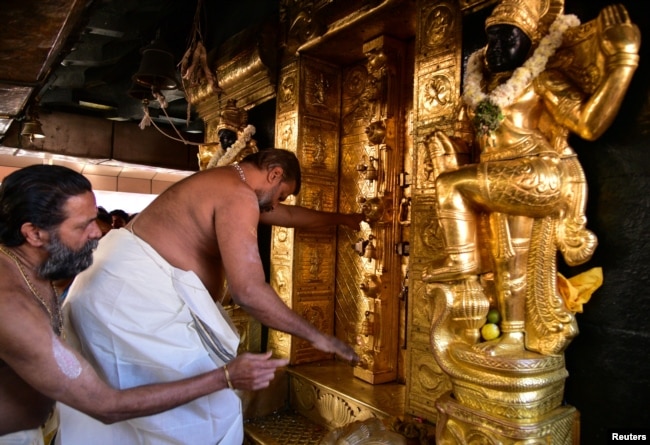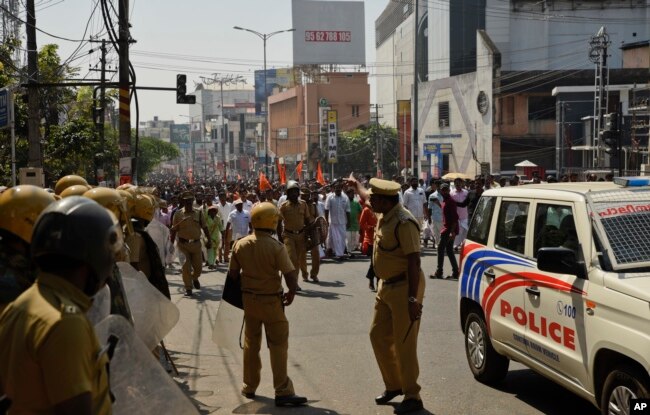Two women who made history in India’s southern Kerala state by entering one of Hinduism’s holiest temples that barred women between the ages of 10 and 50 have been staying in hiding but say they are not fearful of reprisals, VOA news reports.
Bindu Ammini, a law lecturer and Kanaka Durga, a government employee, defied the hundreds of protesters who have blocked women from entering the temple after India’s Supreme Court ruled that women have an equal right to pray at the shrine. Both women are in their forties.
Kerala has been wracked with violence since they went into the shrine — one person has been killed and thousands have been arrested across the state.
Gender equality
From an undisclosed location the two women told a handful of reporters they were not surprised by the backlash from those angered by their entry but were motivated by their determination to ensure respect for the court’s judgment. “It was an important step for gender equality. That also upheld the validity of Supreme Court judgment,” Ammini told local TV news channels. She says she is not bothered about her safety but believes in exercising her rights.
“These two women were brave and willing to face consequence of their action,” Prasad Amore, a psychologist who accompanied them into the shrine told VOA.
The centuries-old tradition of not allowing women inside the shrine is born of the belief that the temple deity, Lord Ayappa, is a celibate. While tradition holds that menstruating women should not enter Hindu temples because they are unclean, Sabarimala is unusual in barring women in a broad age group.
Ammini and Durga got a measure of the strong opposition from Hindu groups to women being allowed inside the shrine during a previous failed effort by them to access the temple in December. Like several other women who attempted to approach the shrine, they had to turn back as strident protesters on approach roads blocked them.
That is why on January 2nd, they went in unobtrusively through a side entrance at night, taking care to merge with the devotees so that they were not noticed. “We walked very naturally among the crowd. Nobody expected that women will just walk into the crowd like that,” says Amore, who was part of the group that planned their entry. “They had to be careful that time, they should not stare at anyone and attract attention.”
The two women had a plainclothes police escort. Amore says he accompanied the women into the shrine because he believes in gender justice.
But while offering prayers at the shrine may have gone off unnoticed, the aftermath has been chaotic. Angry protesters led by right wing Hindu groups have denounced their entry as “carefully choreographed” and accused the state’s left wing government of facilitating it to destroy Hindu traditions. They say courts cannot interfere in matters of deeply-held faith and charge that the women were not genuine devotees but activists.
Ammini and Durga deny that they are activists or have any political affiliations. They came together on an online group formed by a social activist, Shreyas Kanaran, to ensure that the court’s ruling is implemented. “We cannot stick in medieval times,” says Kanaran. “Every woman in our world should be an activist. An activist can be a devotee also, there is no such division.”
A third woman in her forties a Sri Lankan national — is reported to have entered the shrine a day after them, but she says she had her uterus removed which means she could not menstruate. Temple authorities have denied she went in.
Meanwhile Ammini and Durga have said they hope to get back to their normal lives soon, but it is not clear when that will happen as deep divisions continue to roil Kerala.
With India headed for elections this year, the issue has become mired in political controversy right wing groups led by the Bharatiya Janata Party are supporting the protestors while the state’s left-wing government says it is bound to ensure that the court’s orders are not violated. Much of the violence has been sparked by clashes between the right wing and left wing groups.


